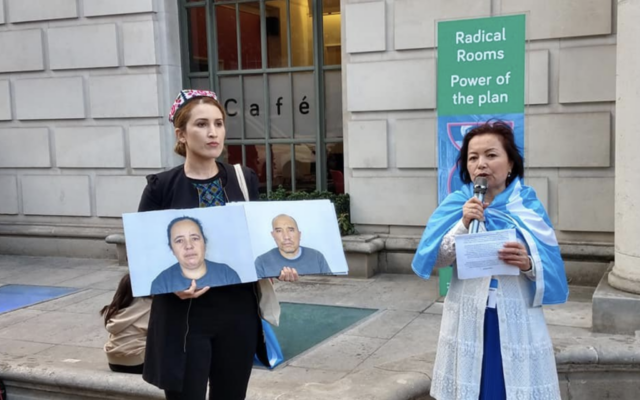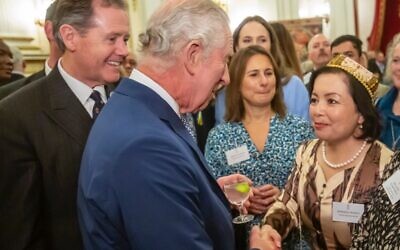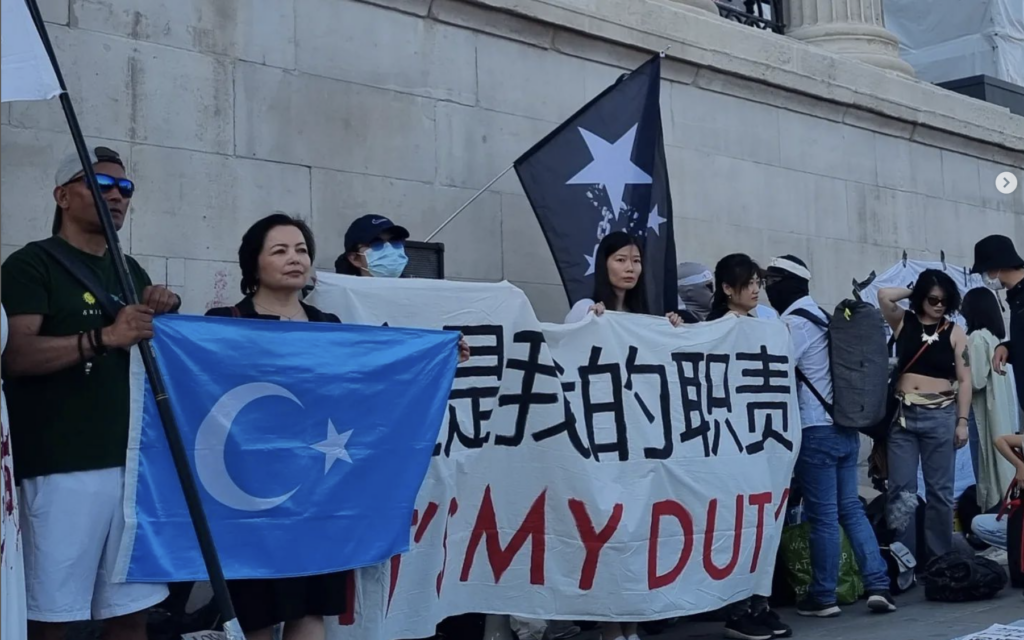‘Despite the millions in prison we Uyghur activists are tiny in number – we need more help’
With a special conference of the World Uyghur Congress taking place next week Jewish News hears from UK representative Rahima Mahmut about the urgent need for organisations to add to the pressure on China
“Even though they don’t see the bombings, they don’t see the killings, there are people dying. Millions are imprisoned unfairly, forced to work as slaves in the 21st century.”
Rahima Mahmut is talking about China’s persecution of her people, the Uyghur. Born in the autonomous region of Xinjiang, north-west China, she has lived in exile for more than 20 years. As UK director of the World Uyghur Congress, and head of Stop Uyghur Genocide, Rahima campaigns tirelessly for the protection of the Muslim minority ethnic group.
China’s brutal treatment of the Uyghur dates at least to 2014 but concern internationally took off in 2022, when pictures emerged of concentration camps and other serious rights abuses. The Jewish community, especially in the UK, has supported Uyghur activism and Jewish News has been keen to report and support.
As Rahima made clear last week as she continues to press international organisations to lobby the Chinese government, whose treatment of the Uyghurs is seen as genocide, she is particularly grateful for the Jewish community’s backing.
“We have really strong Jewish support in this and we’ve been seeing the results,” she says.
Mia Hasenson-Gross, leader of UK Jewish human rights group René Cassin, has worked hard to spread the word about what is happening and Chief Rabbi Ephraim Mirvis has written in the national press of feeling “compelled to speak about” on behalf of the Uyghurs.
In the US, organisations such as Jewish Watch and the Holocaust Museum are leading supporters. And next week the Elie Wiesel Foundation – named in honour of the Holocaust survivor and political activist – is co-organising a two-day interfaith conference in New York, titled ‘Disrupting Uyghur Genocide’.
“But we need many more other organisations,” Rahima says. “Just imagine if other communities also supported in such a way. We are a very small number, the Uyghur activists who are working full-time on advocacy; we are very outnumbered. You cannot imagine, we are only maybe a dozen.”
Among the weapons the Chinese government uses against the Uyghur people are heavy surveillance and disinformation. “We normally can’t get updates, because of the complete blockage of communication, except for important leaks from the inside,” Rahima says. “The last leak was the 2022 Xinjiang Police File, which revealed over 2,000 photographs of the detainees. Once you are in prison in China, you are a slave labourer. The youngest was 15 years old and the oldest was 78. For people over 70, it’s basically a death sentence.
“It’s obvious that the Chinese government is providing narratives and forcing the Uyghurs inside to ‘tell the Xinjiang story well’. They have witnessed deaths and disappearances of family members, relatives or work colleagues. So people are absolutely terrified, to the extent that they say whatever they are told.”
The Uyghurs are also prevented from fasting at Ramadan. “Neighbourhood officials were recruited specifically for controlling and monitoring Ramadan, to prevent anyone from praying or practising,” Rahima says. “Religious practice was supposed to be a very basic right for Uyghur people, but this has been completely taken away.
“The forced sterilisation and birth control is also ongoing. Everything that they are doing is genocidal. It is not only a cultural genocide, but also a physical genocide.”
She highlights the pain such uncertainty brings. “Even in war-torn countries, people can at least phone to see what happened, or know if a relative is dead or is alive, but with us, we are just completely kept in the dark.
“It’s a unique situation that we’ve been experiencing. We have this internet world, and the smartphone, and it’s so easy to be able to communicate, but we can’t, and that’s the most painful thing. So many people around me are experiencing unbelievable pain.” She says about 900,000 children have been taken from their families and put in orphanages, or ‘boarding schools’ as the Chinese government calls them.
While international press has played a key role highlighting the Uyghurs’ plight, Rahima adds: “Two or three years ago, we could see a lot more information from inside, either from leaked documents or from the journalists who went there and visited there.” The BBC journalist John Sudworth, who did much work on the subject, was expelled in 2021. Rahima pays tribute, though, to the German anthropologist Dr Adrian Zenz and Professor Laura Murphy of Sheffield Hallam University who have been monitoring forced labour.
She says countries need to legislate on products of slave labour. “Sadly we are not getting as much traction from governments around the world – apart from the US government, which has passed legislation and seized products created by Uyghur slave labour. At Stop Uyghur Genocide, we are focusing on introducing proper legislation, and working toward a formal recognition of the genocide.”
She is grateful for the support of a huge number of MPs. The House of Commons in 2021 declared for the first time that genocide was taking place against Uyghurs and others in north-west China. The motion approved by MPs does not compel the UK to take action but is a sign of growing discontent in parliament towards the Chinese government.
Now she is focusing on how to secure more commitment from politicians. “As it’s election year [in the UK], we need to work very hard to make sure that whoever is going to be in government includes us in their manifesto. We are campaigning that trade shouldn’t be as normal, there should be more sanctions.”
Recently, she has collaborated with the World Uyghur Congress and the End Uyghur Forced Labour Coalition on a project aimed at tackling what is being termed solar slavery.
The solar panel industry is heavily complicit in Uyghur slave labour, with 90 percent of solar panels being made from polysilicon, and 40 percent of the world’s polysilicon being produced in the Uyghur region.
She is aware that the Jewish community’s involvement is due in part to its understanding of the horror of concentration camps. “It reminds people of the Holocaust, and [there is] the similarity of how Uyghurs are being criminalised and demoralised.
“The term ‘never again’ is so significant – but history is repeating itself right now, as we speak,” she says. The Pears Foundation, founded by the Pears family, has given seed funds to Stop Uyghur Genocide to enable Rahima to employ a campaign officer and an advocacy officer. Additionally, World Jewish Relief has approached her offering humanitarian support.
On a concluding note, I asked Rahima if enough global attention has been drawn to what is happening to the Uyghurs. “How can we measure ‘enough’? she replies. “We are not seeing real actions. We need stronger actions and legislative changes. We need accountability for the ongoing horrors that haven’t stopped. This message has to be very, very clear. We need other communities to really, consistently support us. That’s why we still have a long way to go.”

Thank you for helping to make Jewish News the leading source of news and opinion for the UK Jewish community. Today we're asking for your invaluable help to continue putting our community first in everything we do.
For as little as £5 a month you can help sustain the vital work we do in celebrating and standing up for Jewish life in Britain.
Jewish News holds our community together and keeps us connected. Like a synagogue, it’s where people turn to feel part of something bigger. It also proudly shows the rest of Britain the vibrancy and rich culture of modern Jewish life.
You can make a quick and easy one-off or monthly contribution of £5, £10, £20 or any other sum you’re comfortable with.
100% of your donation will help us continue celebrating our community, in all its dynamic diversity...
Engaging
Being a community platform means so much more than producing a newspaper and website. One of our proudest roles is media partnering with our invaluable charities to amplify the outstanding work they do to help us all.
Celebrating
There’s no shortage of oys in the world but Jewish News takes every opportunity to celebrate the joys too, through projects like Night of Heroes, 40 Under 40 and other compelling countdowns that make the community kvell with pride.
Pioneering
In the first collaboration between media outlets from different faiths, Jewish News worked with British Muslim TV and Church Times to produce a list of young activists leading the way on interfaith understanding.
Campaigning
Royal Mail issued a stamp honouring Holocaust hero Sir Nicholas Winton after a Jewish News campaign attracted more than 100,000 backers. Jewish Newsalso produces special editions of the paper highlighting pressing issues including mental health and Holocaust remembrance.
Easy access
In an age when news is readily accessible, Jewish News provides high-quality content free online and offline, removing any financial barriers to connecting people.
Voice of our community to wider society
The Jewish News team regularly appears on TV, radio and on the pages of the national press to comment on stories about the Jewish community. Easy access to the paper on the streets of London also means Jewish News provides an invaluable window into the community for the country at large.
We hope you agree all this is worth preserving.
























